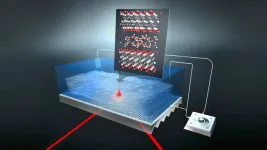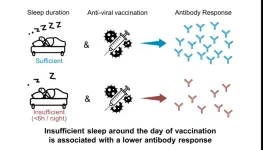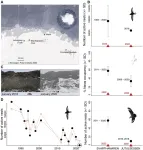(Press-News.org) Scientists from German Cancer Research Center (DKFZ), together with colleagues from Germany, Israel, and the USA, have found that the gut microbiome may modulate the efficacy of CAR-T cellular immunotherpy CAR-T cells in patients with B cell lymphomas. Individualized microbiome information retreaved from patients‘ gut microbiomes prior to initiation of CAR T therapy could accurately predict their subsequent responsiveness to therapy, but only in the condition that these patients were not pre-treated with broad spectrum antibiotics.
Increasing evidence from human studies and preclinical experiments suggests that the gut microbiome may modulate the efficacy of T cell-driven cancer immunotherapies, such as immune checkpoint blockade. Immunotherapy with CD19 chimeric antigen receptor (CAR)-T cell has opened up new treatment options for patients with certain forms of refractory and relapsing B-cell leukemias or lymphomas. But the therapy is hampered by considerable heterogeneity in responses. Complete and long-term remission is only achieved in up to 40% of patients.
Researchers from multiple centers in Germany and the United States, led by Eran Elinav, director of the DKFZ-Weizmann Institute of Science Microbiome & Cancer Bridging division, have found that the gut microbiome may modulate the efficacy of CD19 CAR-T cell immunotherapy in patients with B cell leukemias and lymphomas.
This largest prospective study of its kind has followed 172 lymphoma patients previously failing multiple rounds of chemotherapy, from before CAR T immunotherapy initiation until two years later. Interestingly, 20% of patients receiving a subset of broad-spectrum ("high-risk") antibiotics, such as meropenem, piperacillin–tazobactam or cefepime, featured an altered clinical response to subsequent CAR-T therapy, compared to patients who received other antibiotics and patients who were not treated with antibiotics prior to therapy. However, this antibiotics-associated reduced CAR T therapy response was not driven by the effects of the antibiotics themselves, but rather by the fact that patients treated with "high-risk" antibiotics before initiation of CAR T therapy tended to have higher pre-therapy tumor burden and systemic inflammation as compared to non-antibiotics-treated patients. These adverse pre-treatment conditions rendered subsequent CAR T therapy less effective.
Importantly, exclusion of these confounding "high-risk" antibiotics-treated patients from the analysis enabled the researchers to identify strong and previosuly masked associations between the pre-CAR T therapy gut microbiome and subsequent clinical response to immunotherapy (including patients‘ survival). To further strenghen the connections between the starting microbiome and CAR-T efficacy across geography, diet, and and other 'local' confounders, the researchers next used machine learning models trained on the German patients and then applied as a validation on the respective American patients. Importantly, the models were able to potently predict therapy outcomes, but only upon exclusion of patients exposed to "high-risk" antibiotics. In other words, the study showed that the pre- therapy gut microbiome in lymphoma patients can help predict their response to subsequent CD19 CAR-T therapy across populations, unless their microbiome is disrupted by wide-spectrum antibiotics.
The researchers identified several key microbiome features enabling the prediction of CAR-T efficacy, including species of Bacteroides, Ruminococcus, Eubacterium, and Akkermansia. Of these, Akkermansia was also associated with higher baseline peripheral T cell levels in these patients.
In all, the study reveals strong associations between microbiomes and CAR-T outcomes, which first author Christoph Stein-Thoeringer (now Professor at the University Medical Center Tübingen, Germany) believes may contribute to the development of microbiome-based predictions of CAR-T cell immunotherapy outcomes. Additionally, findings from this study may enable to better understand the differential CAR-T cell activation, persistence, and clinical efficacy in different patients. The study also highlights the need for further investigation into the causal nature of the relationship between the gut microbiome and cancer immunotherapy outcomes. "These exciting findings", states Eran Elinav, "exemplify the potential of our unique microbiome signatures to be harnessed as possible markers of disease and treatment responsiveness in multiple human disorders, including cancer. With further research we hope that microbiome-based diagnostics and therapies will be incorporated into the precision oncology field".
Christoph K. Stein-Thoeringer, Neeraj Y. Saini , Eli Zamir, Viktoria Blumenberg, Maria-Luisa Schubert, Uria Mor, Matthias A. Fante, Sabine Schmidt, Eiko Hayase, Tomo Hayase, Roman Rohrbach, Chia-Chi Chang, Lauren McDaniel, Ivonne Flores, Rogier Gaiser, Matthias Edinger, Daniel Wolff, Martin Heidenreich, Paolo Strati, Ranjit Nair, Dai Chihara, Luis E. Fayad, Sairah Ahmed, Swaminathan P. Iyer, Raphael E. Steiner, Preetesh Jain, Loretta J. Nastoupil, Jason Westin, Reetakshi Arora, Michael L. Wang , Joel Turner, Meghan Menges, Melanie Hidalgo-Vargas, Kayla Reid, Peter Dreger, Anita Schmitt, Carsten Müller-Tidow, Frederick L. Locke, Marco L. Davila, Richard E. Champlin, Christopher R. Flowers, Elizabeth J. Shpall, Hendrik Poeck, Sattva S. Neelapu, Michael Schmitt, Marion Subklewe, Michael D. Jain, Robert R. Jenq & Eran Elinav: A non-antibiotic-disrupted gut microbiome is associated with clinical responses to CD19-CAR-T cell cancer immunotherapy
Nature Medicine 2023, https://doi.org/10.1038/s41591-023-02234-6.
END
Gut microbiome plays key role in response to CAR-T cell cancer immunotherapy
2023-03-13
ELSE PRESS RELEASES FROM THIS DATE:
IPK researcher use TurboID to uncover new meiotic proteins in Arabidopsis thaliana
2023-03-13
During meiosis, reshuffling of genetic information between homologous chromosomes through meiotic recombination creates variable gametes and hence genetic variation in offsprings. Meiotic recombination occurs in the context of the meiotic chromosome axis, a proteinaceous structure along which sister chromatids are arranged in a loop base array during prophase I. Data across organisms suggests meiotic chromosome axis serving as a scaffold for meiotic recombination.
In the model plant A. thaliana, the axis associated proteins ASY1 and ASY3 are critical for synapsis and meiotic recombination. “Due to the key role of axis proteins such as ...
Superstore MXene: New proton hydration structure determined
2023-03-13
One of the biggest challenges for a climate-neutral energy supply is the storage of electrical energy. Conventional batteries can hold large amounts of energy, but the charging and discharging processes take time. Supercapacitors, on the other hand, charge very quickly but are limited in the amount of stored energy. Only in the last few years has a new class of materials been discussed that combines the advantages of batteries with those of supercapacitors, named pseudocapacitors.
Promising materials: Pseudocapacitors
Among pseudocapacitive materials, so-called MXenes consisting of a large family of 2D transition metal carbides and nitrides appear particularly promising. Their structure ...
Fewer sports injuries with digital information
2023-03-13
The number of injuries in youth athletics is significantly reduced when coaches and parents have access to digital information on adolescent growth. It also takes twice as long for the first injury to occur. This is shown in a study from Linköping University published in the British Journal of Sports Medicine.
Many promising athletes have had their careers ruined because of injuries. One thing that almost all events in athletics have in common is a high load for a short time, as in jumping, throwing and running. ...
Getting a good night’s sleep could boost your response to vaccination
2023-03-13
We all know how important sleep is for mental health, but a meta-analysis publishing in the journal Current Biology on March 13 found that getting good shut-eye also helps our immune systems respond to vaccination. The authors found that people who slept less than six hours per night produced significantly fewer antibodies than people who slept seven hours or more, and the deficit was equivalent to two months of antibody waning.
“Good sleep not only amplifies but may also extend the duration of protection of the vaccine,” says senior author Eve Van Cauter, professor emeritus at the University of Chicago who, along ...
Entire populations of Antarctic seabirds fail to breed due to extreme, climate-change-related snowstorms
2023-03-13
The arrival of the new year is a prime time for Antarctic birds like the south polar skua, Antarctic petrel, and snow petrel to build nests and lay their eggs. However, from December 2021 to January 2022, researchers did not find a single skua nest on Svarthamaren, one of the regions where the birds go to raise their young. Similarly, the number of Antarctic petrel and snow petrel nests dropped to almost zero.
In these regions, climate change caused snowfall and snow accumulation to be significantly higher than in previous years. Now, a study published on March 13 in the journal Current Biology shows that these unusually strong snowstorms ...
Assessment of the risk of venous thromboembolism in non-hospitalized patients with COVID-19
2023-03-13
About The Study: In this study of 398,000 adult outpatients with COVID-19, the absolute risk of venous thromboembolism (VTE) was low. Several patient-level factors were associated with higher VTE risk; these findings may help identify subsets of patients with COVID-19 who may benefit from more intensive surveillance or VTE preventive strategies.
Authors: Margaret C. Fang, M.D., M.P.H., of the University of California, San Francisco, is the corresponding author.
To access the embargoed study: Visit our For The Media website at this link https://media.jamanetwork.com/
(doi:10.1001/jamanetworkopen.2023.2338)
Editor’s ...
Remote blood pressure management program enhanced care during pandemic
2023-03-13
BOSTON – Hypertension is the leading risk factor for death worldwide. During the COVID-19 pandemic, routine blood pressure assessments decreased because of global disruptions to medical care delivery. However, new research has found that a remote hypertension program, operated by Mass General Brigham since 2019, successfully supported patients through the pandemic in achieving their blood pressure goals, with patients who enrolled during the pandemic reaching and maintaining their goal blood pressures an average of two months earlier than in the pre-pandemic period. The results, published in Journal ...
Too little sleep could make vaccination less effective
2023-03-13
How strongly a vaccine protects you may depend on getting enough sleep in the days before and after inoculation, finds a new meta-analysis examining the relationship between sleep duration and the body’s response to vaccination.
Sleeping fewer than six hours per night around the time of vaccination was associated with a robust decrease in antibody response, according to the multi-institution study published March 13 in Current Biology. Adults are typically recommended to get between seven and nine hours of sleep per night.
The meta-analysis included data on the association between sleep duration and antibody responses for the ...
Not getting enough sleep could blunt antibody response to vaccination, leaving you more vulnerable to infection
2023-03-13
In reviewing data from previous studies, a team lead by researchers at the University of Chicago and the French National Institute of Health and Medical Research (Inserm) found that individuals who had fewer than six hours of sleep per night in the days surrounding vaccination had a blunted antibody response. That indicates efforts to promote heathy sleep duration ahead of an immunization could be an easy way to improve vaccine effectiveness. The study was published March 13 in Current Biology.
The latest work builds off a 2002 study by members of the team showing that restricting sleep ...
A new immune pathway sheds light on ALS
2023-03-13
While drugs are on the market to slow the progression of neurodegenerative diseases, there are still no cures. But researchers at Boston Children’s Hospital and Harvard Medical School are looking for new pathways for slowing neuronal dysfunction and treating amyotrophic lateral sclerosis (ALS), a fatal motor neuron disease. The team found that proteins involved in the innate immune system could be at the root of the disease.
“The unmet need for therapies for neurodegenerative diseases is huge, and our work opens up a whole new ...



